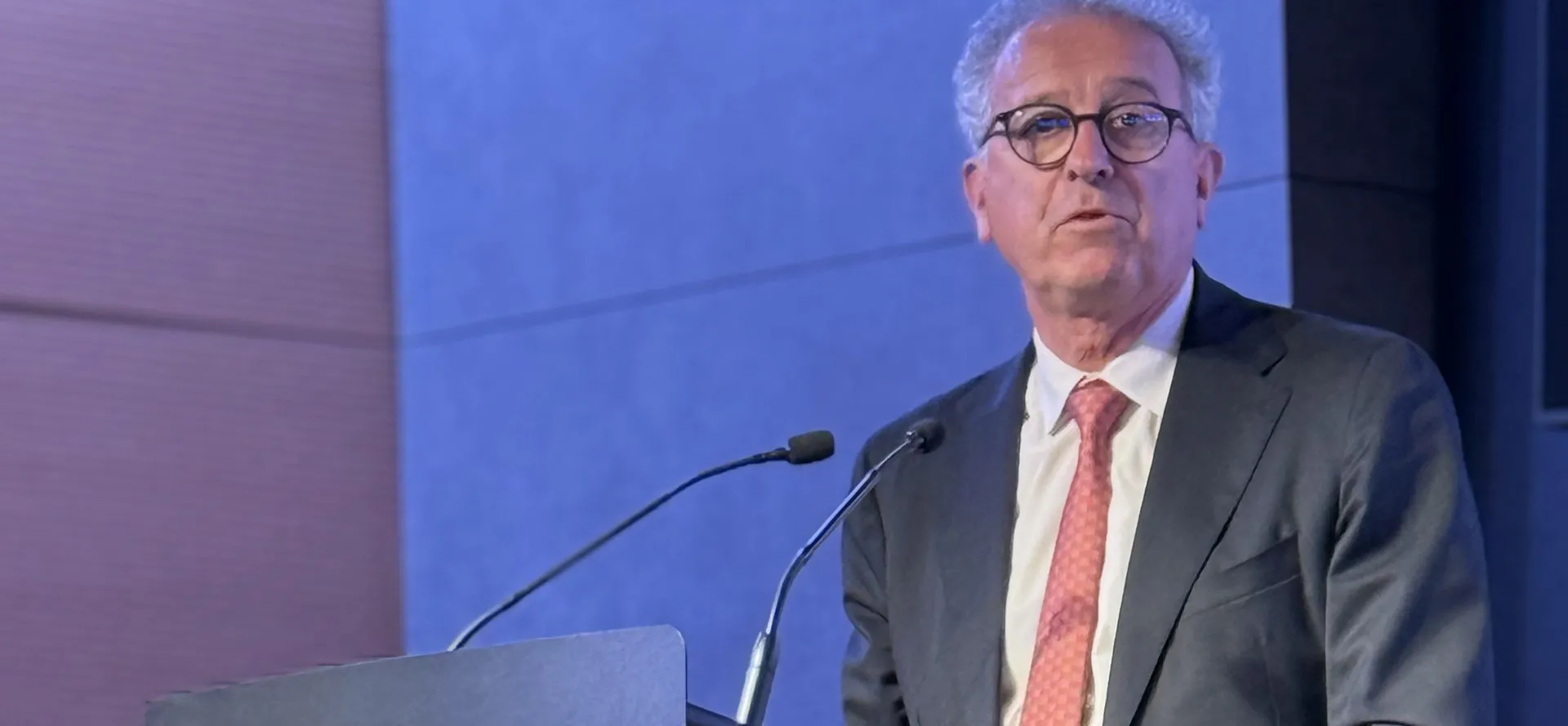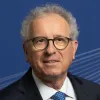Laudatio for Klaus Regling

Pierre Gramegna, ESM Managing Director
Laudatio for Klaus Regling
Conference by Fondation du mérite européen
“Building and preserving the euro”
Luxembourg Chamber of Commerce
Luxembourg, 2 June 2025
(Please check against delivery)
Ladies and Gentlemen,
It is a great pleasure to stand before you this evening to celebrate an outstanding European. A person whose contributions have played a key role in shaping Europe’s financial architecture: Klaus Regling.
For me, this moment is particularly special, because I have the privilege of being his successor.
We spent many hours and long nights together in Eurogroup meetings, back when I served as Luxembourg’s Minister of Finance. I have seen Klaus’s analytical capacities, clarity, and sense of duty up close.
I particularly remember the night of 9 April 2020, when the Eurogroup welcomed the proposal for a package of three measures worth €540 billion to fight the consequences of the pandemic. These measures by the European Investment Bank, the European Commission, and the European Stability Mechanism (ESM) were aimed at protecting businesses, workers, and sovereigns.
Let us look back at his career and achievements.
Klaus was born in Lübeck, former capital of the Hanseatic League. He studied in Hamburg and Regensburg, where he wrote his master’s thesis on optimal currency areas in the mid-1970s. This was an early sign for his future passion for the euro.
I think it is widely recognised that one of the main “Hanseatic” values is modesty. But, given his achievements, that doesn’t make my task easy. Indeed, his contribution to Europe is truly remarkable.
Many rightly remember him as the founding force behind the European Financial Stability Facility (EFSF), and later, its permanent successor, the ESM. And rightly so: these institutions were instrumental in saving the euro. But his impact stretches beyond that pivotal chapter.
Let me highlight just one example.
In the 1990s, at the German Finance Ministry under Theo Waigel, Klaus was one of the key contributors to the Stability and Growth Pact, the backbone of fiscal coordination in the EU.
As Director General for Economic and Financial Affairs at the European Commission (ECFIN), Klaus was committed to the implementation of the rules of the framework he had helped design.
Then came the year 2010. It was the year when the euro area truly entered a storm.
Markets lost faith in certain countries’ capacity to repay them. Trust was eroding. And there was a missing piece in the European architecture: there was no lender of last resort. In other words, there was no institution that would lend money to a country when everybody else has decided not to anymore. Of course, there was the International Monetary Fund. But even for the IMF, helping several developed euro area countries with large amounts of money became too much.
So, the decision was made to create a temporary rescue fund, the EFSF. A lender of last resort for the euro area. It was set up in Luxembourg as a private company, based on Luxembourg corporate law, to act quickly.
But there was one essential question: who could lead it?
Finance ministers gathered in Luxembourg to discuss names. Jean-Claude Juncker, then President of the Eurogroup, was stunned not to see Klaus on the list. Klaus was contacted, and he decided to drive to Luxembourg. At the time, he was in Brussels, running a consultancy after spending one year at a university in Singapore, sharing his knowledge and experience.
Later, he joked: “I’ve never gotten a job that quickly.”
But what a job it was. Little did he know. There was no staff, no office, no phone number, no email, no internal governance framework. There was no credit rating.
Everything had to be built from scratch, while the euro area’s existence was under threat. And yet, within just seven months, the EFSF issued its first bonds to support Ireland. This, at a time when some were questioning the very future of the euro.
Some countries and investors didn’t believe in the euro. Some walked away from EFSF bonds. So, Klaus travelled, like a pilgrim. He travelled to Asia, looking for investors, and built trust. I have continued this commitment.
The EFSF later became the foundation of the ESM. But these two institutions were very different. In terms of legal framework, governance, and capital structure. Creating the ESM required an additional and consequential legal and political effort.
And yet, because of Klaus’s leadership and his capacity to recruit talented colleagues in management and staff, the EFSF and ESM evolved into strong, trusted institutions. They provided nearly €300 billion in financial assistance to five euro area countries in need.
Of course, there were moments that were very rough.
Klaus was at the centre of some of the most difficult and divisive debates, especially during the Greek crisis. He was heavily criticised, at home in Germany, and in Greece as well. Yet, he stayed focused on the mission. He remained true to himself: committed, calm, patient, and principled.
And, in the end, the results spoke for themselves. Reforms were painful and they paid off. Thanks to the government’s commitment to implement reforms, the EFSF’s and the ESM’s firepower, and accommodative monetary policy, trust and stability returned gradually. Today, the five countries that were supported by the EFSF and the ESM have been performing well compared to the euro area average, thanks to the reforms that were undertaken.
Throughout all this, Klaus was the embodiment of composure. His calm demeanour, analytical clarity, and ability to stay grounded under immense pressure earned him the nickname “Mr Stability.”
His commitment was unshakable. He often joked that the euro was his third child, alongside his daughter and son. A reflection of the deep personal commitment he brought to the European project. And, of course, that commitment came with real sacrifices.
Constant trips around the world to give speeches and explain the ESM and the euro area to investors. Many late nights. Many weekends at the office.
And this is where his wisdom came in. In true Klaus fashion, pragmatic and forward-thinking, he made one of his first executive decisions. He bought a good coffee machine. It served faithfully for many years and proved indispensable for ESM staff members during countless hours of work.
Klaus didn’t just protect the euro in its darkest hours. He helped lay the foundations for a stronger, more resilient Economic and Monetary Union. His vision and his dedication have left a permanent mark on Europe’s financial future.
Ladies and Gentlemen,
We often say that institutions matter. That rules and frameworks matter. And they do. But behind every strong institution, there is a person. A person who believed in it. Who gave it credibility. Who convinced others to believe in it too. For the ESM, and for the euro, that person was Klaus Regling.
The euro has been part of his professional career for 40 years. We owe Klaus a profound debt of gratitude. Financial stability is essential to protect economies and citizens. It is also a key contributor to peace.
The best way to describe Klaus’s career is the following: he participated in the planning of the euro since the early steps, then implemented the rules of the euro area, and finally managed the newly created lenders of last resort, the EFSF and the ESM. He deserves to be called a key architect of our common currency, the euro.
Danke, Klaus!
Author

Contacts


